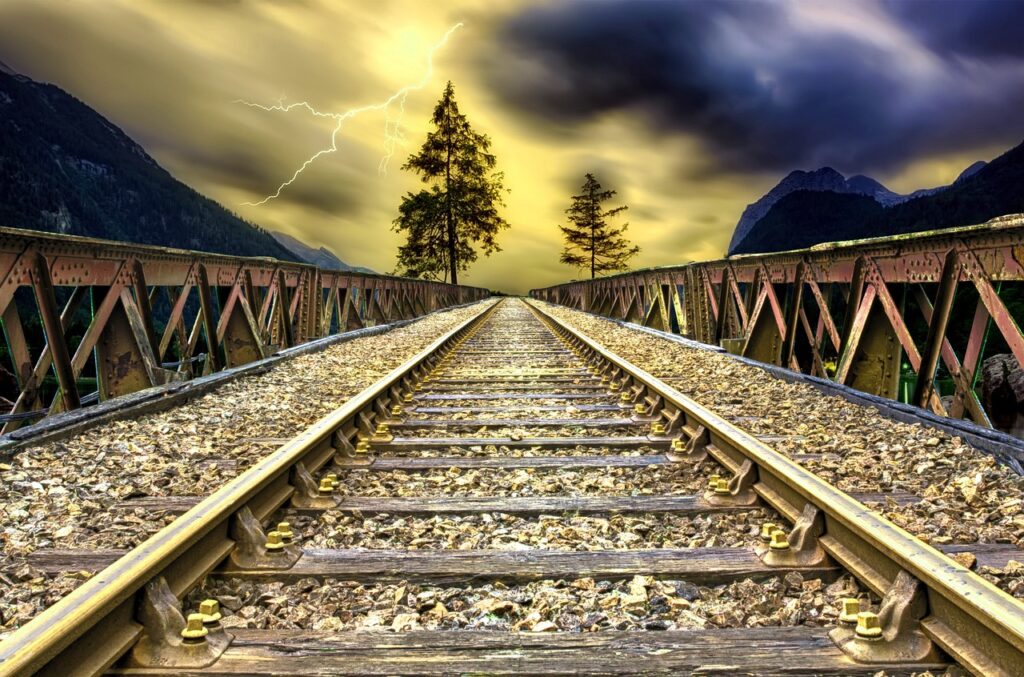Image by Md Abu Musa from Pixabay
Jela walked between the railroad tracks. He inhaled the amalgamated scent of the creosote and the chilled mid-December rain. He timed and measured his pace so as to avoid the shifting, and uneven gravel between the ties. The tracks traversed the dismal, decaying, industrial fringe of town and then snaked their way towards the river between the high ridges to the North. The flotsam and jetsam of industrial detritus collected at the mounded stone margins which supported the rails.
The parallel trails of discarded refuse grew fainter as the town melted into the hills. No clear line of demarcation separated the urban from the rural or the sacred from the profane. Eventually, and without consciously seeking the change, Jela found himself among the towering greened conifers and barren winter hardwoods, their tops obscured by a blue/grey/white fog. The scent of pine and decaying leaf litter now accompanied the fragrance of December rain and creosote.
Jela had learned to walk without snagging his toes and tripping on the roughened terrain, thus freeing his eyes to scan the hemisphere of his vision. He accounted many forest denizens on his walks. The squirrels and chipmunks often announced his arrivals with urgent chirps and squeals. The other mammals, particularly the deer, seemed, at first, shocked, and then imperiled, to encounter a man in such an odd place. They had grown to know a struggling passing coal train as but some noisy, chuffing, benign colossus. In contrast, a man was not benign, or bound by the double steel leash and was thus capable of untethered violence. And so the creatures, who evinced no fear of a colossus, found Jela and his species terrifying and would scurry for refuge at man’s sight and scent. Jela understood their evolutionary imperative but often wished they would linger just a bit longer.
Jela began to tire, and took his first rest against the soaring yellow pine which marked the halfway point between the town and the trestle. He retrieved a sealed glass bottle of water and a pack of toasted cheese crackers from the deep pockets of his drab canvas jacket. On most days, Jela ate very little, mostly cellophane-sealed snacks and noodles. He was slim, almost imperially so.
Jela stuffed the wrapper into the bottle and sealed it, and then stood and slapped the crumbs from his jacket and set forth again toward the trestle.
Soon, his hips began to ache, not a novel sensation but an annually worsening one, such that twice more he had to pause till the worst of it passed. But in time, the terminus of the forest became clear, first a tiny steel-constructed aperture in the distant mist becoming larger and clearer with each labored step. Then, Jela could hear the rushing waters of the swollen river below.
He leaned against the first massive column, its chalky and flaking red paint marring his coat. He surveyed the rolling muddy river some two hundred feet below and some four hundred yards across. The bridge’s span was a marvel of architecture to Jela, an unfathomably-scaled intricacy of a child’s erector set, shiny tracks atop treated and blackened wood beams secured by bolts as thick as a strong man’s wrist to sections of tripod-like frames.
Here, spaces of six inches separated the ties, and as Jela crossed the trestle, he could view the river on each side as well as between the gaps beneath his feet. And although they were too narrow to fall between, the gaps were unsettling. Jela recalled many years ago when he and his mottled setter walked these rails. The animal refused to cross the trestle and recoiled at Jela’s attempt to coach him as if it were a sorcerer’s call to sacrifice. Jela then recalled how the setter’s aged hips had failed, and the immense pain he suffered, till Jela could no longer impotently watch.
When Jela reached the midway point of the span, he stopped and marveled at the trees and rafts of tangled islands of brush being swept along by the flooded river’s haste. He contemplated the potency of the water as he likewise contemplated the human arrangement suspended above it.
Suddenly, he was free of the structure, his jacket inflated by the wind and gravity. Then, he felt the numbing, therapeutic frigidity of the waters and tasted its muddy remedy.
Alan Caldwell lives in Carroll County Georgia, but is working on moving to his rural property in the mountains of Northeast Alabama. He has been married to his lovely wife, Brandi, for 33 years. He has one son, Caleb, who is a firefighter, a daughter-in-law, Chelsee, who is an emergency room nurse, and a grandson, Asher. Alan has been teaching for 27 years and spends much of his free time outdoors or reading. Alan has been collecting stories, mostly about his family, for over 40 years, but has just begun writing them.
the mountains of Northeast Alabama. He has been married to his lovely wife, Brandi, for 33 years. He has one son, Caleb, who is a firefighter, a daughter-in-law, Chelsee, who is an emergency room nurse, and a grandson, Asher. Alan has been teaching for 27 years and spends much of his free time outdoors or reading. Alan has been collecting stories, mostly about his family, for over 40 years, but has just begun writing them.
